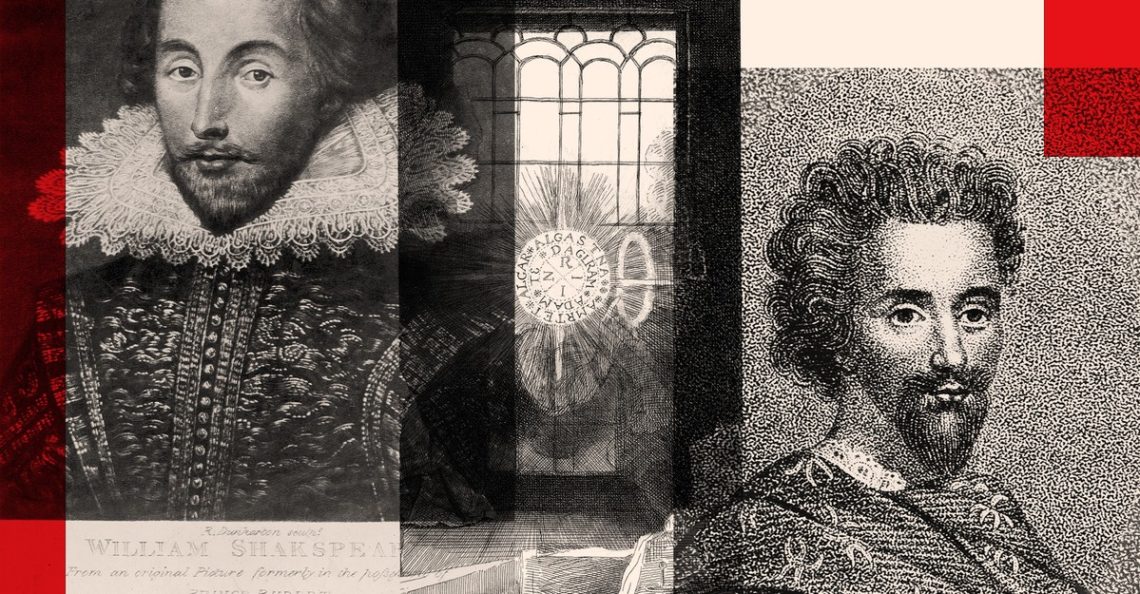If you close your eyes and picture an artistic genius, chances are that the portrait will be framed by a Romantic ideal that took shape 200 years ago: an artist dedicated solely to his (almost always his) muse and transgressive appetites, breaking his era’s rules both moral and artistic, remaking society with his art. But this vision of genius is a poor fit for many great artists, and it tends to obscure what makes them and their work special. Take William Shakespeare, who is often portrayed as a carouser, downing pints while exchanging barbs with his fellow writers, cheating on his wife with both men and women, passionately engaging his quill to reimagine the very nature of the human being.
The little we know of Shakespeare’s life calls most of this into question. The man wrote two plays a year for much of his career, worked as an actor, and probably helped manage the theater company in which he was a major shareholder. His work was more conservative when it came to violence and sex than that of his peers. He did not invent any of the major components of his dramaturgy, and he almost always adapted existing source material. He invested wisely, worked hard to attain the rank of gentleman, and retired in his beloved hometown. If Shakespeare was, as Ben Jonson wrote, the “soul of the age,” that may be in part because his life was nearly as conventional as any actor’s or writer’s in his time.
Shakespeare was shaped as much by that time as he was a shaper of it, and despite being the English language’s greatest writer, he defies the common vision of a genius at the cultural vanguard. Luckily, another brilliant Elizabethan playwright better suits the Romantic model: Christopher Marlowe.
As Stephen Greenblatt relates thrillingly in his new biography, Dark Renaissance, Marlowe led a brief and stormy life that deeply transformed the theater. He likely pioneered both the soliloquy and iambic pentameter on the English stage. He was never regularly employed, and he was completely disinterested in business. His plays gleefully plumb the wickedest aspects of the human psyche, delivering tales of relentless conquest, Jewish perfidy, deals with the devil, and gay love. The most famous of these works, Doctor Faustus, is about the glories and perils of eccentric genius. Marlowe’s life story is also filled with near escapes, nefarious friends, bizarre escapades. He was almost prosecuted for counterfeiting. Multiple people accused him of outspoken atheism, a transgression then punishable by death. He was probably gay, possibly a spy, often in trouble with the law, and even died in a fight over a bar tab—stabbed through the eye with a knife.
Greenblatt, a scholar and critic both highly acclaimed and somewhat controversial, is clearly drawn to Marlowe because he’s such a deliciously Romantic figure. Greenblatt argues that Marlowe “awakened the genius of the English Renaissance,” and that this was possible only because his life on the edge provided the materials necessary for his plays. Dark Renaissance is beautifully written and frequently perceptive about Marlowe’s work and times, but Greenblatt’s investment in making myth over documenting history becomes more of a problem as the book progresses. His imaginative storytelling techniques, well known to readers of his previous books Will in the World and The Swerve, often threaten to push him into the realm of historical fiction. Dark Renaissance will teach you a great deal about Marlowe’s brilliance and the Elizabethan era—its theater, the aristocracy, the spy craft, and the finer points of drawing and quartering religious dissidents. But much of what it has to say about Marlowe’s life story is pure supposition.
At the beginning of his career, Greenblatt helped usher in the New Historicist movement in early modern scholarship, championing the idea that English departments should ditch both the postmodern treatment of the author as dead and New Criticism, with its fetish for close reading, and instead place works within their historical and social contexts. For example, if you know about the succession crisis that gripped the English court toward the end of Queen Elizabeth’s life, Julius Caesar, Hamlet, and several other plays gain new resonance. New Historicism was a much-needed corrective—my own Shakespeare podcast, Lend Me Your Ears, could not have existed without it—but its limits often arise, ironically, regarding the very era that Greenblatt specializes in. We know so little for sure about the lives of the great poets of the 16th and early 17th centuries that we have no choice but to speculate. Shakespeare didn’t keep a diary; when we say that Julius Caesar encodes English subjects’ fears that their world was about to fall apart, we are making an imaginative leap.
Greenblatt’s work for a popular audience takes that leap about as far as it can go. The contract his books implicitly serve the reader is that he will be wildly but openly speculative. He will track for us when he is making informed assumptions or imaginative re-creations, and present the evidence that supports his inventions. In exchange, we will get a more entertaining and adventuresome book. At best, all of his perhapses and could have beens will lead to unexpected, thought-provoking conclusions. But a slight of hand is at work; the maybes of one chapter become the assumptions of the next, and at times contrary evidence is entirely ignored.
Dark Renaissance’s vision of Marlowe rests on the ideas that he was a heretic and a spy. The major evidence for the former is a letter written by one of Marlowe’s enemies, along with a confession by the playwright Thomas Kyd that was made under torture. The lacunae in the record lead Greenblatt to sprinkle breadcrumbs of heretical thought through his tale. Early on, he speculates that, at Cambridge, Marlowe’s friend John Greenwood “may have introduced” him to two other men who “were highly critical of the official religious settlement.” Before long, Dark Renaissance treats Marlowe as a confirmed and known unbeliever.
The question of Marlowe’s spying is one of the great controversies in early modern English literature, and it also originates in his Cambridge years. Marlowe almost did not graduate because of unauthorized absences, and Queen Elizabeth’s advisers on the Privy Council intervened on his behalf. The letter they wrote asked that Marlowe (they called him Morley) be allowed to graduate because he had done the Queen “good service.” We do not know for certain where he went during the absences or what the service was. Theories about this abound—all have their evidentiary shortcomings—but Greenblatt agrees with a common one that sees Marlowe traveling to France and uncovering Catholic conspiracies against the Crown.
Marlowe’s supposed involvement in spying then becomes the skeleton key to his psyche. By the time the writer meets Shakespeare (a meeting that has never been confirmed), we are in the realm of pure fiction. “Marlowe,” Greenblatt writes, “was evidently skilled at drawing out what others intended to keep in the dark. That is, after all, a spy’s skill. He might have hinted first at Catholic sympathies to see how Shakespeare would respond.” (Shakespeare, in Greenblatt’s telling, demurs.)
The occasion for their meeting is a collaboration on the writing of Henry VI, which is presumed because the editors of The New Oxford Shakespeare edition of his plays determined, via computer analysis, that Marlowe co-wrote the play. Although the notion that Shakespeare collaborated with other writers in his early career is not controversial, the New Oxford’s attribution model is. But for Dark Renaissance’s project, these complexities seem less important than the need to tell a coherent, compelling story, one that comes to feel predetermined by the myth of the Romantic genius.
Myths are not bad in and of themselves, and the imagination is a necessary component of interpretation. One could easily say my earlier (also somewhat speculative) portrait of Shakespeare as a diligent pencil pusher is a myth meant to comfort me, now that my carousing days are over and I write book reviews from my basement, surrounded by snoring dogs. If we see Greenblatt’s project as mythmaking, Dark Renaissance becomes something far more pleasurable and less troubling.
However, mythmaking exacts costs on our understanding of the past. Greenblatt’s story requires a cartoonishly authoritarian and brutal England. It was both of those things, but its censorship regime also allowed Marlowe’s transgressive plays to be performed, and its audiences loved his work despite living in a land “as backward in poetry as it was in painting, sculpture, and the life of the mind.” As Dark Renaissance goes on, its mythmaking also interferes with Greenblatt’s greatest skill: the interpretation of the plays themselves. Instead of this, we have scholarship as tautology. The plays are interpreted through the lens of Marlowe’s imagined life; these interpretations then bolster claims about his biography. Thus a wonderful section on The Jew of Malta climaxes in an unfortunate vision of the text as a secret message to Lord Strange, a wealthy and important patron of the arts. Like a literary George Smiley, Greenblatt sets to work decoding the play and imagines a ham-fisted note warning Strange to watch his back. “I urge upon you,” Marlowe (via Greenblatt) writes, “by the example of the fable I have staged, to be supremely alert and cunning,” because “someone is always trying to outsmart and destroy you.”
There is, as you might guess, no real evidence that Strange and Marlowe even knew each other personally.
Greenblatt’s myth of a Romantic Marlowe almost singlehandedly pushing England into the Renaissance betrays the principles of New Historicism by shortchanging the roles of so many other key players. There’s Shakespeare, of course—but not only him. As Daniel Swift reveals in his new book, The Dream Factory: London’s First Playhouse and the Making of William Shakespeare, another important kind of brilliance is necessary for the flourishing of the arts: business acumen.
Swift’s story is really about the invention of capitalism—and the mad chancers, con artists, and prestidigitators on whom it relies. Shakespeare’s and Marlowe’s plays owe their existence in part to a man named James Burbage. With his partners, Burbage built an outdoor amphitheater, called the Theatre, on which many others, including the Globe, were based. As Swift makes clear, the Theatre endured only because Burbage was good at improvising and snookering his business partners. His shady dealings were also responsible for much of the knowledge we have about this institution. We might not have Marlowe’s day planner, but the legal records of the staggering number of lawsuits in which Burbage was involved as either plaintiff or defendant, thankfully, survive.
Although some perhapsing and mythmaking inevitably find their way into The Dream Factory, Swift is far more diligent about the factual record than Greenblatt is. He is also nowhere near as vivid a storyteller. Still, to anyone interested in what really happened during the Renaissance, Burbage emerges as a fascinating character—a colorful and daring businessman, constantly doubling down on practices that were, as Swift puts it, “startlingly modern” rather than admitting defeat. He did not own the land on which the Theatre was built, but he spent a great amount of other people’s money on its construction and subsequent renovation. A theater under construction generates no income, but as Swift writes, “Burbage had learned—perhaps he intuited it—that it is better to have an asset than to work for a wage. It is better to hold capital than to pay your debts.”
Looming over both of these books is Shakespeare, whose achievements so eclipse those of his contemporaries that they can become difficult to see. Dark Renaissance and The Dream Factory both serve as timely reminders that no single artist can create a golden age. Periods of brilliance such as the one that flourished during the reigns of Queen Elizabeth and King James I require many different forms of genius. Without Burbage, there would have been no Theatre in which Marlowe’s early plays could premiere. Without Marlowe, there might have been no iambic pentameter, and no soliloquies. Without the invention of the joint-stock company, Shakespeare would not have had his greatest asset, a regular group of actors for whom he could write. And we would not be reading about any of these men if Shakespeare had not written plays that would endure for hundreds of years. Dark Renaissance boldly argues that transgressive innovators, far from going out of style, have always been necessary for artistic advancement. But as a scholar who has staked his career on the effect that history has on art, Greenblatt should know that the times are not made by one person alone.
The post The Stubborn Myth of the Literary Genius appeared first on The Atlantic.




